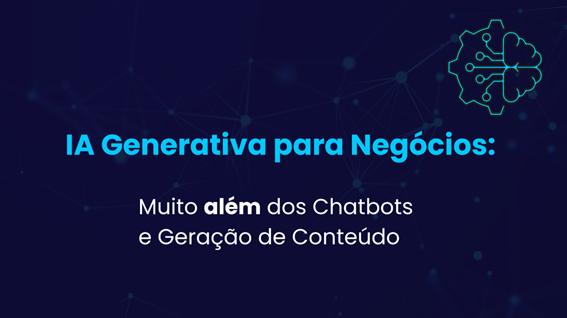With the advancement of machine learning — a technology that enables systems to learn and adapt autonomously, improving decision-making without continuous programming — combined with the growing volume of data and scalable computing, companies now have an unprecedented opportunity to transform their operations. Artificial Intelligence (AI) adoption is accelerating and redefining competitive advantage across industries. In highly demanding markets such as insurance, Generative AI for Business is enabling organizations to enhance risk analysis, streamline processes, and deliver highly personalized customer experiences.
Understanding Artificial Intelligence, Machine Learning, and Generative AI
Artificial Intelligence (AI) refers to systems capable of performing tasks that traditionally required human intelligence, automating processes with high precision and efficiency. Most modern AI solutions rely on machine learning (ML), which analyzes massive datasets to develop intelligent decision models. These models continuously evolve with new data, generating outputs and decisions that simulate human reasoning.
Among the most transformative innovations in this field is Generative AI. Since the evolution of Large Language Models (LLMs) in 2022, generative AI has stood out not only for creating content but also as a powerful tool for processing unstructured data and integrating intelligence into complex workflows.
In the insurance industry, where companies handle vast amounts of information from multiple sources, generative AI brings a unique ability to transform how data is managed. It acts as a reasoning engine that supports strategic workflows, empowering automation and analytical capacity across business operations.
Why Apply Generative AI to Business?
According to Goldman Sachs, Generative AI could increase global GDP by 7% (approximately USD 7 trillion) and boost productivity by 1.5 percentage points over the next decade. We are witnessing a turning point where customer interactions, decision-making, and operational processes will be redesigned through this technology.
In the insurance sector, developing a strategy that incorporates generative AI is essential for improving workforce productivity, automating workflows, and unlocking new efficiencies.
Key Categories of Practical Applications
1. Enhancing Customer Experience
Chatbots and Intelligent Virtual Assistants
Advanced AI-driven chatbots and voice assistants streamline customer self-service while reducing operational costs. These tools connect to CRMs and databases, providing real-time responses such as policy details or claim history through text or voice.
Agent Assistance and Conversational Analytics
Beyond customer service, generative AI acts as a reasoning engine, helping agents handle complex inquiries. Integrated with claims and underwriting systems, it gathers and summarizes data, automates research, and recommends tailored solutions based on each client’s profile and history.
Personalization and Smart Recommendations
By analyzing behavioral patterns and preferences, generative AI enables insurers to recommend additional coverage or policy adjustments in real time, increasing satisfaction and retention.
Process Optimization and System Integration
Generative AI connects to enterprise management systems (ERPs) and claims platforms to automate document processing, form completion, and report generation ensuring accuracy and compliance.
2. Increasing Workforce Productivity
Conversational Search and Knowledge Retrieval
AI-powered conversational interfaces dramatically improve employee productivity by providing instant, relevant answers and summaries from extensive datasets — allowing teams to focus on decision-making rather than data gathering.
AI Coding Assistants for Developers
In IT teams, generative AI accelerates development cycles by suggesting code, automating debugging, and fixing vulnerabilities. This reduces time-to-deploy while improving software reliability.
AI Copilots for Business Analysts
AI copilots assist business analysts by generating meeting summaries, identifying requirements, and translating discussions into actionable project documentation — boosting efficiency and collaboration.
Insurance Applications
Across underwriting, claims management, and policy servicing, generative AI enhances risk assessment, pricing precision, and process automation — shortening turnaround times and improving service quality.
3. Workflow Optimization with LLMs as Reasoning Engines
Automated Document Processing
LLMs extract structured data, summarize large reports, and answer complex queries. For instance, in claims processing, AI can analyze thousands of documents (policies, reports, medical records) in minutes, identifying critical information and generating actionable insights.
Synthetic Data Generation for ML Model Training
When data is limited or sensitive, generative AI creates synthetic datasets to improve machine learning model accuracy without compromising privacy. This is particularly valuable in risk modeling and fraud detection.
Workflow Automation and System Integration
By connecting directly to process automation tools, LLMs streamline approvals, form completion, and notification management, ensuring every stage is executed efficiently.
4. Content Creation, Sales, and Marketing
Marketing
Generative AI accelerates the production of marketing materials — including blog posts, social media updates, and newsletters — while maintaining brand tone and accuracy.
Sales
AI personalizes outreach by generating tailored emails, sales scripts, and talking points for specific segments, improving engagement and conversion rates.
Product Development
In product design, AI generates multiple prototypes based on parameters and user feedback, optimizing iterations and aligning innovation with market needs.
Conclusion
AI does not replace humans — it amplifies human capability. The key lies in using it correctly to generate value.
Much like choosing between a broom and a vacuum cleaner, the best tool depends on the situation. Generative AI extends far beyond chatbots and text generation; when strategically applied to business processes, it becomes a transformative driver of efficiency and innovation.
To fully realize its potential, companies must identify their operational pain points and integrate AI where it maximizes efficiency and business impact — going far beyond surface-level automation toward intelligent, value-generating transformation.
Discover Ebix Latin America: The Leading Insurtech in the Insurance Market

Learn more at www.ebixlatinamerica.com.br
Ebix Latin America is a global insurtech specializing in innovative digital solutions for insurers and brokers. As a technology leader in the insurance industry, we offer the most comprehensive digital solution stack, delivering efficiency, automation, and seamless integration across all business areas.
With nearly 400 employees and offices in São Paulo, Rio de Janeiro, and Curitiba, we serve all of Latin America — the largest company in Brazil dedicated exclusively to insurance technology.
We turn challenges into innovation. Join the revolution in the insurance market!



